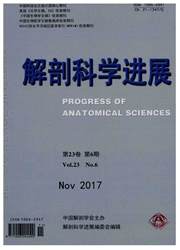

 中文摘要:
中文摘要:
目的Wnt通路的异常激活与恶性肿瘤的发生和进展关系密切,我们在前期研究中发现肺癌中也有Wnt通路异常激活的现象,而体轴抑制因子Axin是Wnt通路的抑制因子,本研究的目的是探讨Axin对肺癌细胞侵袭力的影响及其机制。方法构建野生型和突变型Axin质粒(Axin与β-catenin结合位点剪切突变),转染人肺腺癌SPC—A-1(SPC)细胞,应用GSK一3βsiRNA阻断β—catenin的降解,Western bolt检测各处理组细胞中B—catenin和MMP-7的变化,Transwell检测各处理组细胞侵袭能力的变化。结果转染野生型Axin明显的下调B—catenin和MMP-7的蛋白表达以及SPC细胞的侵袭力(P〈0.01),而GSK-3β siRNA可以阻断Axin的这种功能,转染突变型Axin不能有效的下调B—catenin和SPC细胞的侵袭能力。结论Axin抑制SPC细胞的侵袭力,可能与其下调β—catenin,负向调控Wnt通路有关,Axin可能成为临床治疗肺癌的新靶点。
 英文摘要:
英文摘要:
Objective The abnormal activation of Wnt pathway correlates with the tumorigenesis and tumor progression. We previously reported that Wnt pathway was abnormal activated in lung cancer. We aim to study the effect of Axin(the suppressor of Wnt pathway) on lung cancer cell invasion and its possible mechanism. Methods We constructed wild-type Axin plasmid and Axin mutant plasmid(with β-catenin binding site sheared) to be transfected into human lung adenocareinoma SPC-A-1(SPC) cell line, GSK-3β siRNA was used to block the degradation of β -catenin. Western bolt was performed to detect the expression of β-catenin and matrix metalloproteinase 7 ( MMP-7 ) in each group, transwell was performed to present the change of invasive ability in each group after transfection. Results Transfected wild-type Axin significantly downregulated β-catenin and MMP-7 protein expression and SPC ceils' invasion (P〈0.01), transfected GSK-3β siRNA could block this function of wild-type Axin, but transfected mutant Axin could not downregulate β- catenin expression and inhibit SPC ceils' invasion. Conclusion Inhibiting the invasion of SPC cells by Axin may be related to downregulating β -catenin and inhibiting Wnt pathway, Axin might become a new target for the clinical treatment of lung cancer.
 同期刊论文项目
同期刊论文项目
 同项目期刊论文
同项目期刊论文
 Leucine zipper tumor suppressor 2 inhibits cell proliferation and regulates Lef/Tcf-dependent transc
Leucine zipper tumor suppressor 2 inhibits cell proliferation and regulates Lef/Tcf-dependent transc Expression of metastasis-associated protein 2 (MTA2) might predict proliferation in non-small cell l
Expression of metastasis-associated protein 2 (MTA2) might predict proliferation in non-small cell l Expression of Frat1 correlates with expression of beta-catenin and is associated with a poor clinica
Expression of Frat1 correlates with expression of beta-catenin and is associated with a poor clinica Overexpression of small GTPases directly correlates with expression of delta-catenin and their coexp
Overexpression of small GTPases directly correlates with expression of delta-catenin and their coexp Ataxia-telangiectasia group D complementing gene (ATDC) promotes lung cancer cell proliferation by a
Ataxia-telangiectasia group D complementing gene (ATDC) promotes lung cancer cell proliferation by a Overexpression of Frat1 correlates with malignant phenotype and advanced stage in human non-small ce
Overexpression of Frat1 correlates with malignant phenotype and advanced stage in human non-small ce P120-Catenin Isoforms 1 and 3 Regulate Proliferation and Cell Cycle of Lung Cancer Cells via beta-Ca
P120-Catenin Isoforms 1 and 3 Regulate Proliferation and Cell Cycle of Lung Cancer Cells via beta-Ca Clinicopathological significance of cathepsin D expression in non-small cell lung cancer is conditio
Clinicopathological significance of cathepsin D expression in non-small cell lung cancer is conditio Diversin increases the proliferation and invasion ability of non-small-cell lung cancer cells via JN
Diversin increases the proliferation and invasion ability of non-small-cell lung cancer cells via JN Ataxia-telangiectasia group D complementing gene (ATDC) upregulates matrix metalloproteinase 9 (MMP-
Ataxia-telangiectasia group D complementing gene (ATDC) upregulates matrix metalloproteinase 9 (MMP- 期刊信息
期刊信息
